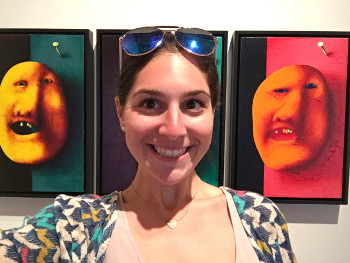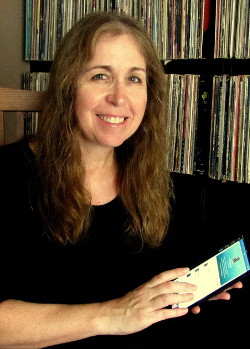The Significance of Selfies – Then and Now
Rutgers’ Byrne seminar encourages students to look closely at their lives in a digital age

'You can tell a lot about someone by the selfies they take and the ones they share with certain networks for certain reasons.'– Mary Chayko, Rutgers professor
Vincent van Gogh painted more than 30 portraits of himself in three years.
Imagine what he could have accomplished with a smartphone and Instagram filters.
The prolific self-portraitist’s work is considered one of the predecessors of the modern selfie, said Rutgers professor Mary Chayko, whose Byrne Seminar, “Selfies and Digital Culture,” explores the cultural significance of selfies then and now.
“People have always thought to express and present themselves through art and technology. That goes back centuries,” said Chayko, a teaching professor of communication and information and director of undergraduate interdisciplinary studies at the School of Communication and Information, Rutgers University-New Brunswick. “If you have something in your pocket that allows you to do that at any moment, I don’t see how that wouldn’t become popular. It taps into our desire to share our experiences and ourselves. To pay attention to, 'like' and comment on one another's digitally shared activities and ideas has become a hallmark of modern culture.”
How do selfies “speak” as cultural objects, and how do they compare to other forms of communication and art? How is knowledge produced and shared in the process of communicating through selfies? How are power differentials expressed as selfies are taken, shared and given meaning in a digital culture? These are the questions Chayko asked her 20 first-year students to consider during the five-week, double-session seminar. The group experimented with rare cameras at George Street Camera, took in centuries-old works of portraiture art at the Jane Voorhees Zimmerli Art Museum and documented their discoveries by posting – what else? – selfies to their Rutgers Selfie Project course blog.
That the seminar quickly filled to capacity didn’t surprise Chayko. She plans to offer it again next fall.
“I think students enjoy the opportunity to look closely at their everyday lives and examine their common behaviors,” she said. “This has been a very curious, inquisitive group. They are not just thinking about selfies and photography but the digital world we live in. They are fascinated with why we want to document everything and how it changes our experience to view it through the lens of a camera.”
Though the practice of taking and posting selfies has been dismissed by some as narcissistic, Chayko said it is a powerful tool that allows us to take ownership of our image and share information about ourselves in a way that wasn’t possible before.
“You can tell a lot about someone by the selfies they take and the ones they share with certain networks for certain reasons,” Chayko said. “When someone takes a selfie at an event that is important to them, think about how they are communicating information not just about themselves but their key causes or professional and personal interests. Once it’s out there it’s a cultural object.”

Carefully crafting your own or someone else’s likeness to convey a message to an audience is hardly a modern phenomenon. It’s a concept the students explored while observing a variety of portraits – from Catholic altarpieces painted in the 1500s to Cold War-era nonconformist Russian sculptures – during the seminar’s tour of the Zimmerli. There they were asked to think about whether cultural products, including art, photographs and selfies, reflect society, shape it – or both. They used selfies shot at the museum to answer that question.
Ema Azuonwu, 18, turned her smartphone’s camera on herself in front of The Celebrities of the Juste Milieu by Honore Daumier. Posing with the series of clay caricatures that mocked French aristocracy from the mid-1800s, she contorted her face with a snapchat filter and posted it to the class blog under the caption “Do I fit in yet?”
The biology major enrolled in the Byrne seminar because she wanted to explore a topic outside her major.
“I’m very interested in social media. I have every account you can think of,” said Azuonwu, who takes selfies every day. “I never paid attention to the selfies I take. This made me think: what do they say about me?”
Andrey Efrenchev, 18, is on the opposite end of the selfie spectrum. The computer science major emigrated from Russia in seventh grade and enrolled in the seminar to understand his peers’ fascination with taking pictures of themselves.
“When I take a picture, I want to capture what I see and not include myself in it,” said Efrenchev, who adds that the only selfies he’s ever taken have been for this seminar. “I want to know the value of capturing yourself in it.”
For media inquiries, contact Lisa Intrabartola at 848-932-0554 or lintrabartola@ucm.rutgers.edu